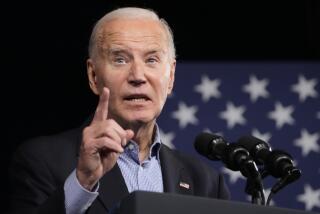Obama says Mideast peace process is in a ‘rut’
- Share via
WASHINGTON — President Obama said Tuesday that the Middle East peace process was in a “rut,” and prodded Egyptian President Hosni Mubarak to help break an Arab-Israeli standoff that has frustrated the administration’s effort to restart talks.
“If all sides are willing to move off of the rut that we’re in currently, then I think there is an extraordinary opportunity to make real progress,” Obama said in an appearance with Mubarak at the White House. “But we’re not there yet.”
Obama’s comments came at the conclusion of Mubarak’s first visit to the White House in more than five years, a meeting that was conceived months ago as part of an ambitious diplomatic push but ended up underscoring the intractability of the issue.
The lack of progress was highlighted by an exchange in which Obama issued a thinly veiled challenge to his counterpart.
“Ultimately there’s going to have to be some courageous leadership, not only from the Palestinians and the Israelis but also from the other Arab states, to support this effort,” Obama said.
Mubarak, who has been in office for 28 years, brushed aside the apparent effort to put any onus on Egypt.
“If negotiations start, this will lead the Arab states to support the peace process and to move it forward,” Mubarak said. “Because I can tell you that the Arab people are fed up with the length [of time] that this issue has taken.”
Since taking office, Obama has pushed both sides to make conciliatory gestures -- urging Israel to halt the building of settlements in territories the Palestinians hope will be their future homeland, while leaning on Arab nations to take symbolic steps such as allowing Israeli planes to fly through their airspace.
Each side has essentially insisted that the other go first.
Egypt has emerged as the Obama administration’s most important ally in the Middle East, because of its relationship with Israel, influence with Palestinian leaders, as well as its ability and willingness to counterbalance Iran.
Obama sought to cement the relationship by selecting Cairo as the location for his June speech to Islamic countries. Mubarak praised the speech, saying it was “a very strong address” that had “removed all doubts about the United States in the Muslim world.”
He also alluded to disagreements with President George W. Bush, saying that despite conflicts “with a previous administration, this has not changed the nature of our bilateral relations.”
The Bush White House had made Saudi Arabia the center of its Middle East efforts, alienating Egypt with criticism of its record on human rights and with the invasion of Iraq. In reversing that course, Obama has opened himself to criticism that he is overlooking Egypt’s record on treatment of prisoners and other issues.
Obama said he and Mubarak had held “an extensive conversation” on the Arab-Israeli conflict, but that they had also discussed how the two nations could work together on other issues including curbing the nuclear weapons ambitions of Iran.
--
More to Read
Sign up for Essential California
The most important California stories and recommendations in your inbox every morning.
You may occasionally receive promotional content from the Los Angeles Times.










